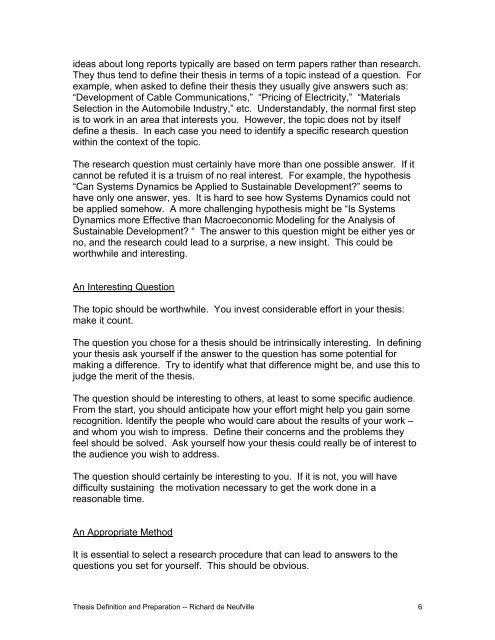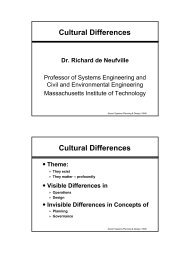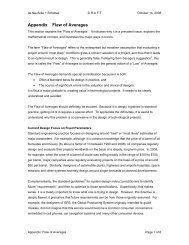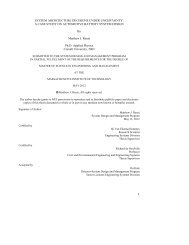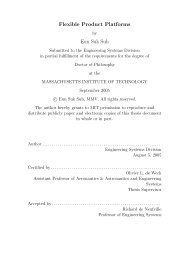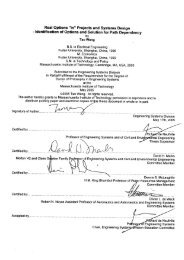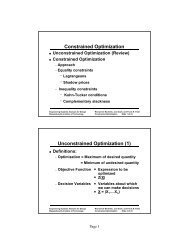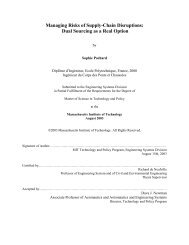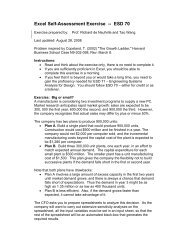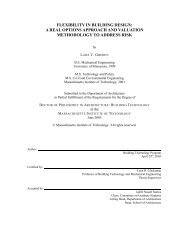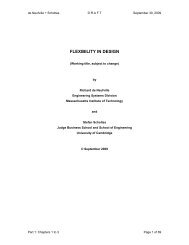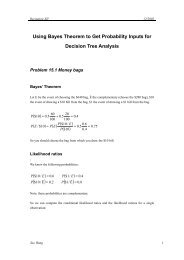Richard de Neufville's TPP SM Thesis Manual - Title Page - MIT
Richard de Neufville's TPP SM Thesis Manual - Title Page - MIT
Richard de Neufville's TPP SM Thesis Manual - Title Page - MIT
- No tags were found...
Create successful ePaper yourself
Turn your PDF publications into a flip-book with our unique Google optimized e-Paper software.
i<strong>de</strong>as about long reports typically are based on term papers rather than research.They thus tend to <strong>de</strong>fine their thesis in terms of a topic instead of a question. Forexample, when asked to <strong>de</strong>fine their thesis they usually give answers such as:“Development of Cable Communications,” “Pricing of Electricity,” “MaterialsSelection in the Automobile Industry,” etc. Un<strong>de</strong>rstandably, the normal first stepis to work in an area that interests you. However, the topic does not by itself<strong>de</strong>fine a thesis. In each case you need to i<strong>de</strong>ntify a specific research questionwithin the context of the topic.The research question must certainly have more than one possible answer. If itcannot be refuted it is a truism of no real interest. For example, the hypothesis“Can Systems Dynamics be Applied to Sustainable Development?” seems tohave only one answer, yes. It is hard to see how Systems Dynamics could notbe applied somehow. A more challenging hypothesis might be “Is SystemsDynamics more Effective than Macroeconomic Mo<strong>de</strong>ling for the Analysis ofSustainable Development? “ The answer to this question might be either yes orno, and the research could lead to a surprise, a new insight. This could beworthwhile and interesting.An Interesting QuestionThe topic should be worthwhile. You invest consi<strong>de</strong>rable effort in your thesis:make it count.The question you chose for a thesis should be intrinsically interesting. In <strong>de</strong>finingyour thesis ask yourself if the answer to the question has some potential formaking a difference. Try to i<strong>de</strong>ntify what that difference might be, and use this tojudge the merit of the thesis.The question should be interesting to others, at least to some specific audience.From the start, you should anticipate how your effort might help you gain somerecognition. I<strong>de</strong>ntify the people who would care about the results of your work –and whom you wish to impress. Define their concerns and the problems theyfeel should be solved. Ask yourself how your thesis could really be of interest tothe audience you wish to address.The question should certainly be interesting to you. If it is not, you will havedifficulty sustaining the motivation necessary to get the work done in areasonable time.An Appropriate MethodIt is essential to select a research procedure that can lead to answers to thequestions you set for yourself. This should be obvious.<strong>Thesis</strong> Definition and Preparation -- <strong>Richard</strong> <strong>de</strong> Neufville 6


